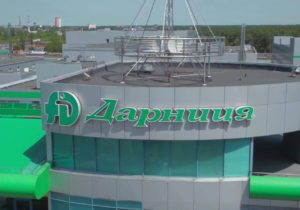
The National Bank of Ukraine (NBU) has improved its hryvnia exchange rate forecast for 2020 as the International Monetary Fund (IMF) and the World Bank did, Ukrainian Finance Minister Oksana Markarova has said, without specifying the concrete figure. In all forecasts and in forecasts of the National Bank, the exchange rate for the next year is strengthened, that is, the rate on which the budget was based (UAH 28.20/$1). Obviously, it will not be like that anymore, the finance minister said in an interview with the Voice of America in Washington.
She added that soon the Finance Ministry and the government will receive an updated forecast of the Ministry of Economic Development, Trade and Agriculture, on the basis of which changes will be made to the draft national budget for 2020.
The forecasts of all the organizations, the National Bank say that the rate is strengthening and this is a long-term trend. Therefore, there will be fluctuations, but we should expect that this strengthening is not some small fluctuation of this year, but this is a new normality, Markarova said.
As reported, since the beginning of 2019, the hryvnia exchange rate has strengthened by 10.3%, to UAH 24.835244/$1.
The National Bank of Ukraine does not officially announce its exchange rate forecasts, at the same time, it sends them to the government for drawing up the draft national budget.

Darnitsa pharmaceutical company in 2018 invested about EUR3.5 million in development and research (R&D), Dmytro Shymkiv, the head of the board of directors of Darnitsa Group, has said.
“Every year we invest about 10% of gross income in development and research. In 2018 the amount of such investments totaled EUR 3.5 million. In total, Darnitsa invested about EUR 200 million in development,” he said at a press conference in Kyiv.
Shymkiv said that in 2020-2022 Darnitsa plans to conduct 9-12 drug bioequivalence studies.
Since 2016, the company has completed eight such studies.
According to him, the development strategy of Darnitsa provides for three priority areas of the product portfolio: cardiology, neurological drugs, and pain therapy.
In 2019, the pharmaceutical company plans to bring 11 brands to the market, in 2020 some 14. In 2018, Darnitsa brought ten brands to the market.
Currently, the company’s product portfolio comprises 250 types of finished medicines.
Darnitsa pharmaceutical company is one of the ten largest pharmaceutical manufacturers in Ukraine and the top ten largest hospital suppliers. Its ultimate beneficiary is Hlib Zahoriy.

Pivdenny seaport (Odesa region), the largest seaport in Ukraine in terms of transshipment volume, increased cargo transshipment by 28.4% in January-September 2019 compared to the same period in 2018, to 38.658 million tonnes.
According to information from the Ukrainian Sea Ports Authority, for the specified period the port increased transshipment of exported cargo by 36.4%, to 28.304 million tonnes, imported freight by 6%, to 5.292 million tonnes, transit by 19.1%, to 5.043 million tonnes.
In January-September, the seaport handled only 12% of the volume of cabotage cargo compared to the same period in 2018, which amounted to 17,450 tonnes.
According to the nomenclature of cargo, in January-September the port raised transshipment of liquid cargo by 10.3%, to 3.265 million tonnes, dry bulk cargo by 34.8%, to 32.285 million tonnes, and reduced transshipment of packaged goods by 2.9%, to 3.107 million tonnes.
Container transshipment amounted to 144,985 TEU (an increase of 87.8% compared to the same period in 2018).
As reported, in 2018 the port increased transshipment of goods by 1.92% compared to 2017, to 42.702 million tonnes.
Pivdenny port was founded in 1978. It is located on the Adzhalyk firth and is the deepest harbor in Ukraine. The length of its berths is around 2.6 kilometers.

Ukraine’s State Forest Resources Agency has launched a pilot project of an electronic registry of logging permits, Viktor Melnychenko, the Director General of the agency’s Forestry Innovation and Analysis Center, has said.
“This is a register of permits that give the right to carry out business activities related to the harvesting of wood. The register of logging tickets covers the entire territory of Ukraine. We collected all the data in one place and started making it available to the public about a month ago,” Melnychenko said at a press conference at the Interfax-Ukraine news agency.
Melnychenko said as of October 16 information on 27,000 issued permits for timber harvesting was published in the register.
In addition, the center presented an online map of timber felling, which also works in a pilot mode and extends to three regions, including Chernihiv, Poltava, and Rivne.
“Today we are working on a system of graphical display of logging on a map of Ukraine in three pilot regions. A month since we started uploading maps. Now we are solving a number of technical issues. By the end of the year, we plan to extend the project to all of Ukraine for enterprises of the State Forest Resources Agency,” Melnychenko said.
In addition, the center plans to launch a register of forest tickets for the industrial gathering of berries, mushrooms, honey, and medicinal herbs. The project is at the final stage of development.
Melnychenko said he expects the parliament to consider and adopt a number of legislative initiatives that will allow the distribution of the electronic wood accounting system, a register of logging and forest tickets and an online logging map for all permanent forest users who also harvest wood, regardless of subordination.
A logging ticket is permission to harvest wood and contains information about the location and volume of the workpiece. The document is issued by the regional forestry and hunting departments at the agency.
The total forest area of Ukraine is about 10.4 million hectares. The forest cover of the country is 15.9%.
Some 7.6 million ha of forests are subordinated to the State Forest Resources Agency (73% of the Forest Fund of Ukraine).